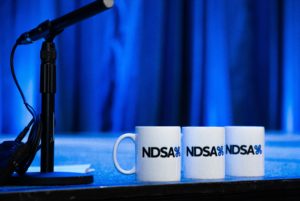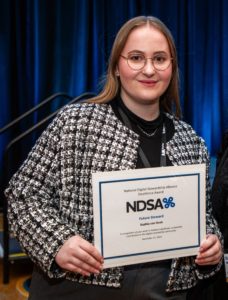NDSA Excellence Awards: A history of growth and celebration
For almost a dozen years the National Digital Stewardship Alliance (NDSA) has been home to the Excellence Awards. From simple beginnings these awards have evolved in response to changes in the field of digital preservation and stewardship, and they will continue to evolve as the field grows and embraces new possibilities. This post offers key points in the history and current practices of the awards.
In August of 2011, a guest post from Trevor Owens on the Library of Congress blog The Signal asked the question: “What kinds of awards would help recognize and encourage work with important collections, tools, services, organizations, and student projects related to digital stewardship and preservation?” This question led to the NDSA Innovation Working Group assembling an action team to complete the first awards cycle in 2012.
In 2016, the awards became more formalized with the adoption of an Innovation Working Group Charter. This document was made available via a wiki and noted that success would be signified by the completion of an awards cycle and increasing awareness of innovations in the field of digital preservation. It also recognized that the merit of the awards was their ability to “communicate the value of digital preservation work within the community and externally to stakeholders at member organizations and the larger world.”
The awards began by accepting nominations in four categories: individual, future steward, project, and organization. In 2017, the Charter was updated, and the Educator category was added, and these five categories were maintained through 2020. In 2021, the working group felt that the long-term impact of innovation should be recognized. To promote this broader perspective, the sixth category, Sustainability, was adopted.
Other important changes were to follow in 2021. First, the working group wanted to provide greater opportunities for NDSA to “highlight and commend all forms of creative and meaningful contributions in the field of digital preservation.” Many felt that the current name of the awards did not support this expanded and purposely broad view; therefore, the name of the awards was changed from the Innovation Awards to the Excellence Awards. A relationship was also growing between the NDSA and the Digital Preservation Coalition (DPC). It was recognized that the biennial DPC Digital Preservation Awards overlapped with the NDSA Excellence Awards, possibly causing confusion and stress on the part of individuals wondering which awards would be the better choice for their submission. Negotiations between the two were completed in 2022, and now the NDSA and DPC interleave their awards ceremonies, giving each cycle the opportunity to receive primary focus.
This agreement also includes cooperative efforts. During each awards cycle, a member will be invited for representative participation of the other on their juries. This agreement reflects the merit sought in the 2016 Charter by promoting greater consistency in criteria and evaluation of nominations, enhancing organizational continuity between the affiliates, and amplifying the award-related communications of each.
In 2023, the working group was facing a complete turnover of its members. Additionally, the DigiPres 2023 Conference Planning Committee had established a liaison position to help coordinate the awards presentation during the conference in November. New members were needed to facilitate the objectives of the group; a call for members returned six respondents, including representatives from the DPC and the Open Preservation Foundation. The roles of the 2023-2025 co-chairs were filled by Kari May and Matthew McEniry.
The group immediately started work on the newest award nominations, reviewing 51 submissions for 24 individual nominees by August 2023. This was done using updated evaluation criteria determined by the working group.The group also utilized new outreach channels offered by new members to garner more submissions from organizations and individuals outside of the U.S.
 After the awardees had been selected and accepted, the group put together blogs to highlight past winners, showcase previous projects, and build up to the current cohort of award winners. The co-chairs meticulously put together an awards presentation that held to the time limitations of the conference (just 15 minutes) and successfully fulfilled the obligations of the group for the year.
After the awardees had been selected and accepted, the group put together blogs to highlight past winners, showcase previous projects, and build up to the current cohort of award winners. The co-chairs meticulously put together an awards presentation that held to the time limitations of the conference (just 15 minutes) and successfully fulfilled the obligations of the group for the year.

January 2024 was the month of the DigiPres Redux virtual conference. Four of the awardees participated in the conference to highlight their work: Stephen Abrams (Individual), Sophia van Hoek (Future Steward), Ashley Blewer (Educator), Michelle Donoghue (Project).
Working Group members facilitated this session and helped to promote a positive and educational environment for all participants. With the rest of 2024 being an interim year with no awards, the group is assembling a number of blogs and video clips to offer a peek into the work and its importance to the field digital stewardship. The first video clip, presenting information on the Individual Category, is now live on the NDSA YouTube channel.
The co-chairs have also spent time reshaping the group’s charter and guidelines to align with current procedures and standards. As 2025 creeps closer, they will soon begin working on the next iteration of the Excellence Awards. Look for more clips to come and remember, if you know some organization or individual you may want to nominate for an award, we’d love to take a look at how they are impacting and supporting digital stewardship.
~ Excellence Awards co-chairs Kari May and Matt McEniry
The post NDSA Excellence Awards: A history of growth and celebration appeared first on DLF.
